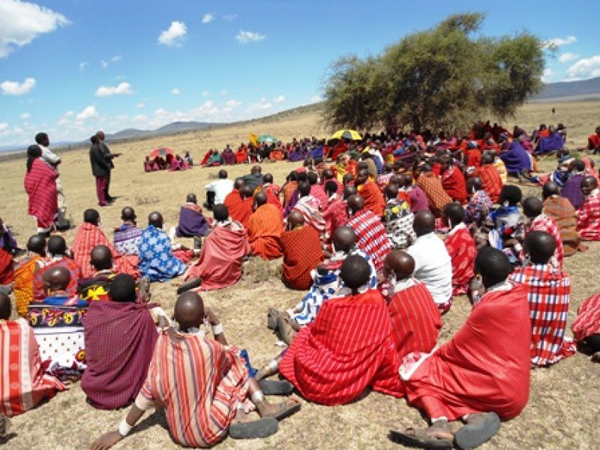Defending human rights, especially against powerful corporate and government interests, has always been a David and Goliath battle. One of the ways EarthRights International (ERI) – a Bertha Justice Initiative partner organization – contributes to this effort is by suing multinational corporations in U.S. courts for the harms they commit abroad. Over the past year, however, two major U.S. Supreme Court decisions, Kiobel v. Royal Dutch Petroleum (Shell) and Daimler AG v. Bauman, have made this particular strategy more difficult. Both decisions left a lot of questions unanswered, and it will be many years before we know just what they mean for future international human rights cases in U.S. courts.
But these cases have never been easy, so from our perspective, not a whole lot has really changed. We’ll certainly keep bringing these cases in U.S. courts. But we’re also pursuing new and creative avenues to support individuals and communities around the world in defense of their environmental and human rights. One powerful way that U.S. lawyers can support legal struggles in other countries is by using our country’s liberal discovery rules to obtain information. Any person with an “interest” in a foreign legal proceeding can file what we’ve been referring to as an application for foreign legal assistance, under 28 U.S.C. § 1782. This U.S. law allows people to obtain relevant documents and sworn testimony from corporations or individuals in the United States to use in support of a case in a foreign court or tribunal. It’s a relatively low cost mechanism and can, in certain circumstances, be accomplished within only a few months.
The 1782 applications are also a way we can work together to leverage the Bertha network and do much more. Beyond the direct benefits to the foreign legal case, this type of transnational collaborative lawyering can bridge continents, transforming a local struggle into an international struggle and fueling a larger advocacy campaign.
In February, with the assistance of ERI, three Tanzanian Maasai communities asked a U.S. court to order Thomson Safaris, a Massachusetts-based tourism operator, and its owners to turn over information to support litigation in Tanzania. The communities originally filed a lawsuit in Tanzania in 2010 after they were forced from their land to make way for Thomson’s luxury safari camp near the Serengeti National Park. Thomson’s website boasts that it offers “a way to experience Africa ethically, comfortably, and intimately.” The Maasai communities have a different opinion: the lawsuit alleges that Thomson’s Tanzanian subsidiary illegally acquired their land and subjected them to violence, impoverishment and intimidation.

In April, a judge granted the Maasai communities’ request and ordered Thomson Safaris and its owners to turn over documents and give sworn testimony about the sale of the land, the alleged home burnings and violence against the Maasai, and the conversion of the land from Maasai grazing territory to a deluxe private reserve. As a result, the communities will obtain critical information that they otherwise could not, since the Tanzanian court wouldn’t have jurisdiction over Thomson, the U.S.-based parent company, or the two U.S. citizens that own the company. But by filing this action in U.S. courts, the communities also brought their story to the United States, and were able to speak their truth to an audience that might not otherwise hear it. After the court ruled, their story made the front page of the Boston Globe, the most important newspaper in the city where Thomson is based, and where a major portion of its clientele reside. The coverage brought the allegations of injustice to the company’s front door and forced the owners to respond to the allegations directly – and publicly. The coverage has also drawn attention to the plight of “conservation refugees,” people who are removed from their land involuntarily in the name of conservation and eco-tourism.
ERI has also recently filed a 1782 application on behalf of a Peruvian protester who was paralyzed by police violence at the site of Newmont Mining’s Conga mine project in Peru. On November 29, 2011, more than 24 peaceful protesters were injured by police acting under contract with Newmont as private security for the controversial project. The application seeks information held by Newmont – such as photographic and video evidence and records of communications with the police – that will shed light on the events of that day and assist a pending criminal investigation against the two commanding police officers and a civil lawsuit against the police and other government actors. The filing has already generated press and social media buzz in Peru, where police repression of social protest against mining operations is endemic, particularly when police officers are deployed as private security. As the U.S. action goes forward, it will present further opportunities in Peru to support those protesting the Conga project and bring public attention to this case and police violence more broadly. It will also present opportunities in the U.S. to draw public attention to Newmont’s operations and its role in police violence against protesters.
Suing big business and powerful corporate interests has never been easy, and our courts aren’t making it easier. But we’ll continue to search for innovative ways to use the law to demand accountability and speak truth to power. We look forward to exploring how these tools can be used to support the work of other Bertha organizations. Together, we can combine the power of law and the power of people across borders to transform local court cases into international struggles for justice.
Michelle Harrison is a Bertha Fellow at EarthRights International
Follow EarthRights International on Twitter @EarthRightsIntl
Article Tags: accountability / Corporate Accountability / Cross-Jurisdiction / Environment / ERI / International Human Rights / Land Rights